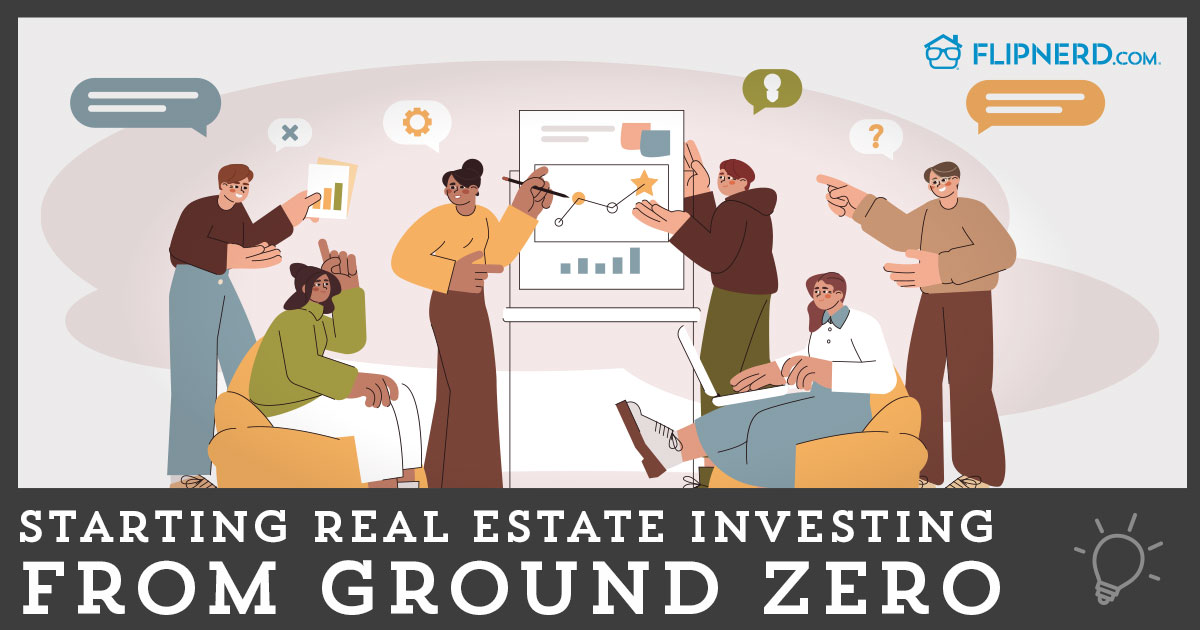No one likes to admit that they’re full of excuses.
It’s defeat. It’s fear of failing.
Your first deal brings an array of emotions, including stress, anxiety, excitement, relief, hope, and a sense of accomplishment. Getting over the hurdle of your first deal can seem impossible, as if you’re looking from the bottom of the mountain to the peak.
It doesn’t have to be that way.
Build yourself a foundation so you are steady when you finally start building your business. Knowledge, experience, and connections are major areas that will help you succeed in your first deal. This takes away some of the obstacles. Know what needs to be done and have people to support you along the way.
Lack of Knowledge and Experience
Those who are thinking about doing their first deal often use their lack of knowledge and experience as a huge influencer that’s holding them back from starting. Knowledge can be gained through a plethora of sources online. Take the time and learn from the best. Everyone learns differently but find a way to absorb as much (quality) information that you can. Listen to podcasts, read blogs, take courses or trainings… anything to help you better understand this business.
An area to consider is what type of investing you want to do.
Ask yourself:
What’s working in your area?
- (Assuming you’ll be doing your first deal in the city you live in or one
that is nearby) Wholesaling can be easier to start out with when
compared to a big rehab project.
Do I have the connections and money to do a fix and flip?
- Rehabbing comes with unexpected costs, including extra repairs you
didn’t account for and holding costs. Be extremely aware of your
budget and time if you decide to go this route.
Do I want to be a landlord?
- For rentals, you can choose to be the landlord or hire the job out to a
property management company.
How will I obtain funds?
- Keep in mind certain lenders don’t provide loans on fix and flips.
Know where your money is coming from before you do the deal.
These are things to keep in mind, as you’re getting ready for your first deal. They’re intimidating questions that can easily derail your focus if you aren’t careful. Take it a step at a time but make sure you’re always moving forwards. These are big questions that will shape your business.
In addition, consider what you’re able to do on your own and also what you should hire out. Play to your strengths and remember that you want to utilize your time wisely (your time is valuable). Areas of weakness aren’t a reason not to do a deal. Don’t be afraid to hire out work and have assistance, as you need it.
If you’re able to, sometimes it can be helpful to partner up for a deal. Trust the partner and absorb everything you can during the process. That being said, be careful who you go into partnership with! Don’t go into a deal without clear expectations for both of you. Having a partner for the first few deals isn’t for everyone but if you have a friend who’s an investor, you might be able to work out a deal with them. It will probably take some of the legwork off of their plate by you helping out (make sure they see the benefit in partnering with you).
We talk about the partnership idea with caution because we know investors who have lost a lot of money and learned the hard way who to trust. As a first deal, we want it to be the best it can be and don’t want you to deal with the headache of a deal gone wrong.
Connections
People say they don’t know the right people. It’s true that real estate investing can be a lonely business, but it’s a business that the more people you know, the more doors are opened. From other real estate investors to vendors to having a buyers list, you need to know people!
REIAs are great for this. Look up a local REIA and attend a few meetings. If there aren’t local meet ups nearby, look into and online REIA so that you can still be surrounded by like‐minded individuals. Attendees will be at all stages of the real estate investing business. Don’t be scared to ask questions. Most are happy to give a bit of guidance.
Real estate agents, brokers, title companies, real estate attorneys, tax advisors (who work with real estate investors), general contractors, plumbers, electricians, and other real estate investors are just a few of the people who could be helpful in your business.
Lack of Funds
We’re doing this to make money and let’s be honest… most of us don’t have enough to pay cash for the deal outright. This right here is enough to stop many potential investors from trying.
This isn’t a deal breaker! Most investors use a loan of some sort to get their deals. Different types of loans will work better for different types of deals. There’s private money (from friends, family, and acquaintances), hard money lenders, government financing, crowdfunding, and even community banks. Do your research and find what works best for you.
There’s No Good Deals Around Me
Unless you’re in a small rural town, there are deals around if you know where to look. For those who are used to buying retail or personal properties, you might be stuck not thinking outside the box on where to find deals.
You can start off with bandit signs around your town. Try and be careful where these are placed so that they aren’t immediately taken down. They’re a cheap way to market and it’s inexpensive if you need to replace them every now and then.
You can also use direct mail to find leads. In order to build your list to mail to, look for out‐of‐state owners, properties with liens against them, vacant properties, distressed properties (do drive‐by’s to look at the conditions of properties).
Too Much Work/Time
This is common for people who have a normal 8‐5 type of job. When you get off work, the last thing you want to do is to do MORE work. Many of you have families and need a break when you get home.
To start out, you need to get leads, which means either having the ability to answer calls at work or hiring an answering service to handle calls for you. You can concentrate on the serious leads this way.
You can also have bird dogs find you deals for a referral fee. This takes out of your profit but allows you to work your normal job while deals are being found for you.
Another option is to buy from a wholesaler, fix it up, and sell it for retail. This doesn’t always have as much profit when compared to finding the deal yourself but it again, saves you on time.
Keep in mind that you are putting in this effort now while working a normal job, so that eventually you don’t have to do the 8‐5 anymore. Have this goal in mind and figure out a schedule that works.
Stop Giving Excuses
Prepare yourself as much as you can but go into your first deal knowing that it will be one of the best learning experiences in your real estate investing career.
Remember why you want to be a real estate investor and how it can help you achieve financial freedom. Don’t be afraid to ask for guidance and have support around you.
You can do this, as long as your stop giving excuses. We believe in you and your success.
Great opportunities await.










